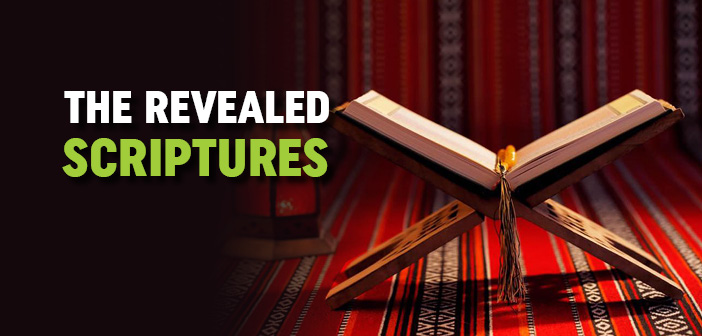What is the revealed sciptures?
What are the scriptures that Muslims are asked to believe in? According to the Qur’an and the Sunnah, they are all of the scriptures revealed to Allah’s messengers throughout human history before Muhammad. For instance, in the Qur’an it says: “We have sent thee inspiration, as We sent it to Noah and the messengers after him. We sent inspiration to Abraham, Ishmael, Isaac, Jacob and the Tribes, to Jesus, Job, Jonah, Aaron, and Solomon, and to David We gave the Psalms.”[1] Twice, the Qur’an refers to an unidentified scripture revealed to the Prophet Abraham—the Ṣuḥuf Ibrāhīm, which is sometimes translated as the Scrolls of Abraham.[2] However, the four scriptures explicitly named in the Qur’an are the Torah (Tawrāt), which was revealed to the Prophet Moses; the Psalms (Zabūr), which were revealed to the Prophet David; the Gospel (Injīl), which was revealed to the Prophet Jesus; and the Qur’an itself, which was revealed to the Prophet Muhammad.[3] Muslims therefore understand the Qur’an as Allah’s final revelation in the same way that they recognize the prophet Muhammad as the Seal of the prophets. This understanding is based on the words of the Qur’an itself: “Step by step, He has sent the scripture down to you [Muhammad] with the truth, confirming what went before; He sent down the Torah and the Gospel as a guide for people. He has sent down the distinction [between right and wrong]”’[4] Scripture has traditionally been understood as being the literal word of God. Anything written about a messenger after his death would therefore not qualify as scripture on account of being a human product. This definition of scripture requires that anything considered revelation must strictly come from God Himself; thus, human speech about God or anything simply attributed to Him cannot meet these requirements. Thus, Muslims believe that the original Torah was given to Moses, the original Psalms to David, the original Gospel to Jesus, and the original Qur’an to Muhammad. They believe, however, that the Torah, the Psalms and the Gospel in their original form have been lost as the scriptures were altered and corrupted by human beings over time. Muslims believe that the Qur’an is now the only revealed scripture that has not been changed from its original form. As a consequence of this the ‘Word of God’ as understood in various denominations of Judaism and Christianity as being indirectly attributed to God or inspired reports of what was witnessed about various figures in the Bible is not considered revelation amongst the vast majority of Muslims. However, if it is directly attributed to God such as when God spoke to Moses, then such communication may be regarded as revelation. Furthermore, for Muslims, the language of scripture must be the same as that in which it was revealed. This means that any translation, being a human product, is not strictly speaking, the Word of God.
In the Qur’an, the communities to whom messengers and revelations were sent prior to the advent of Muhammad’s Ummah are described as Ahl al-Kitāb (literally, People of the Book); meaning a people who have been given a divine writ or revelation. The scriptures that were revealed prior to the Qur’an are believed to have been sent to particular groups of people and nations. By comparison, the only scripture believed to be universally intended for humanity according to Muslim theologians is the Qur’an. The three scriptures Torah (Tawrāt), the Psalms (Zabūr), and the Gospel (Injīl), are therefore understood as having been specifically addressed to the nation of Israel (or as it later was called, Judea). It is stated in the Qur’an, “It was We who revealed the law (to Moses): therein was guidance and light. By its standard have been judged the Jews, by the prophets who bowed (as in Islam) to Allah’s will, by the rabbis and the doctors of the law: for to them was entrusted the protection of God’s book, and they were witnesses thereto […]”; and “in their footsteps We sent Jesus the son of Mary, confirming the Law that had come before him. We sent him the Gospel: therein was guidance and light, and confirmation of the Law that had come before him: guidance and an admonition to those who fear God.”[5][6]
[1].Q. 4:163[2]. Q. 87:9–19; Q. 53:36–62.[3]. Cornell, ed., Voices of Islam, p. 36.[4].Q. 3:3–4.[5]. Q. 5:44, 46.[6].For more information on the Revealed Scriptures, please see Amjad M. Hussain, The Muslim Creed: A Contemporary Study of Theology, Cambridge: Islamic Text Society, 2016, pp. 162-197.
Source: Islam For New Muslims An Educational Guide,Assoc. Prof. Amjad M. Hussain, Erkam Publications





